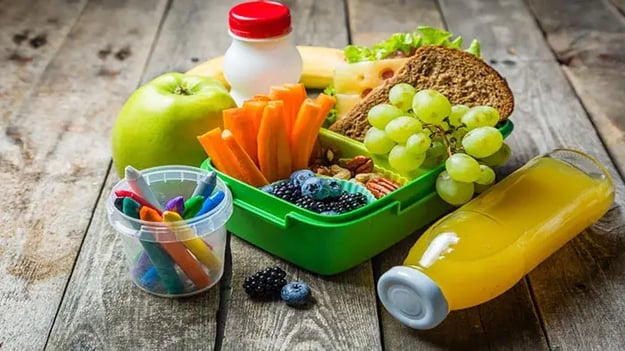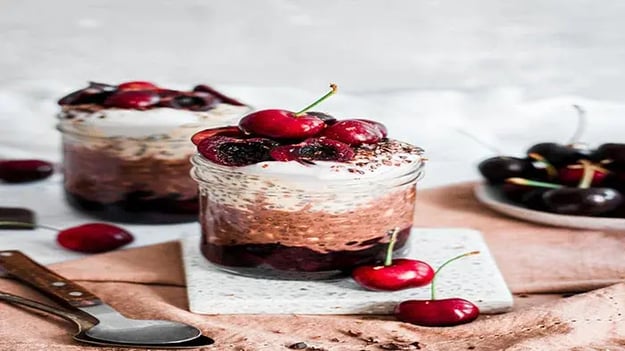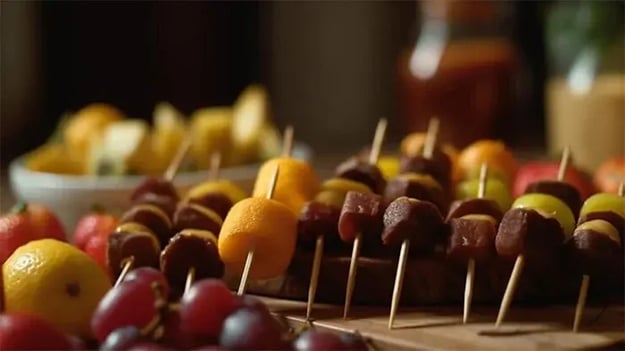- Black forest Overnight Oats
- Fruit and Vegetable Skewers
Packing school lunch boxes is easy, said no parent ever. Unlike adults, who eat almost every food group, unless expressly detested, children aged 6 to 8 rarely finish their plate or their portions of fresh vegetables or fruit desserts. This is so, because, in their mind, there is a negative emotion associated with healthy foods, while positive emotions emerge when they think of fast food.
Therefore, it is important to stop rewarding kids with ‘tasty’ foods for good behavior, and homemade vegetables to ‘teach a lesson’. A better way of establishing a balanced diet is by calculating their daily calorie requirements according to age, and then sorting their daily portions of vegetables, fruits, carbohydrates, proteins, fats, and fiber. This way, your child will have a lower risk of incurring lifestyle diseases and remain fit and healthy.
Since it is summer, try to pack balanced lunches that will not get spoiled in their school bags. Pack dressings and dairy separately. Create balanced meals for your second graders with these general guidelines, to make the perfect school lunchbox.
- Try to exercise portion control. Since children have a much smaller stomach, their capacity to consume is far less than adults, therefore, their servings and food portions should be age appropriate. Just like, if you were on a diet, your second grader would have eaten more without a second thought, your exercise of control as an adult remains, while theirs needs to be developed. Wasting food is horrible, but so is force-feeding your kid till they develop eating disorders. If your plates and lunch boxes are 9-inch in diameter, or of a similar square dimension, offer small, single servings, about the size of your child’s fist, of vegetables, fruits, whole grains, proteins, and dairy, for a balanced meal.
- More vegetables and whole grains should be incorporated into your child’s diet. It is ideal to introduce children to new foods at an early age, as early as infancy. This helps lower the risk of developing food allergies or intolerances of dairy, peanuts, berries, or gluten. Also, the younger your kids, the more flexible they are, both physically and mentally. So cut off all fast and processed foods and try to swap whole grains and vegetables in place of pasta and bread, for healthier carb alternatives.
- Since it is summer, try to make lunchbox snacks simple but creative. Children are flexible, not foolish. Be honest and open with your children, even about their food, as it helps bond and build trust. Try incorporating them in the process. Since kids nowadays are smart enough, a little thoughtful nudge in the right direction and some honesty can do wonders in this digital age. Make their favorite dish together at home, using healthier alternatives. They may adore pizza, so make it a cool meal option by making breakfast naan pizza at home. This will show that you value their taste, making them reciprocate and learn the same.
- As second graders are great at mimicking and learning from their parents, it is ideal to follow a balanced diet and healthy eating habits to become an ideal role model for your children to emulate and follow. And it will also help you clean up your own digestive system and add more energy to your day.
Creating Balanced Meals For Class 2 Lunchboxes

1. Black forest Overnight Oats

This delicious German black forest cake-inspired recipe is very easy to make at home and will win your child’s heart when they open their lunchbox at school. Simply combine rolled oats, vegan milk of choice, ground flaxseeds, almond butter, cocoa powder, almond extract, homemade cherry pie filling, and Greek Yogurt in a bowl, before transferring to a mason jar, alternating layers of cherry pie filling, chocolate chunks, and the rest of the oats. Store in the fridge for at least 4 hours, preferably overnight, and get a luscious lunchbox meal ready for your kids next morning.
2. Fruit and Vegetable Skewers

This is an easy way of incorporating fruits and vegetables into your second grader’s diet while keeping their nutrition intact. Skewer slices of raw vegetables like zucchini, bell peppers, broccoli, carrots, and more, alternating them with pieces of grilled paneer and balls of mozzarella cheese. Prepare a homemade dressing with olive oil, balsamic vinegar, mustard, lemon juice, salt, and pepper, and add on the side. In the case of fruits, it becomes easier, with fruits, and dates alternately skewered, with honey served on the side. If you are feeling fancy, you can also add a few berries dipped in dark chocolate to delight your second graders.
Conclusion
Packing lunchboxes is becoming an art nowadays, and for good reason. Both nutrition and aesthetic beauty are important to allure kids into making the right choices at school. With the multiple temptations of packaged food all around, only your loving culinary efforts and these guidelines can keep second graders steady on a balanced diet.
Kaushiki Gangully is a content writing specialist with a passion for children's nutrition, education, and well-being. With more than five years of writing experience and a science-based background, she provides nuanced insights to help families raise happy, healthy kids. Kaushiki believes in making learning and healthy eating fun, empowering parents with practical, easy advice.
The views expressed are that of the expert alone.
The information provided in this content is for informational purposes only and should not be considered a substitute for professional medical advice, diagnosis, or treatment. Always seek the advice of your physician or another qualified healthcare provider before making any significant changes to your diet, exercise, or medication routines.
















